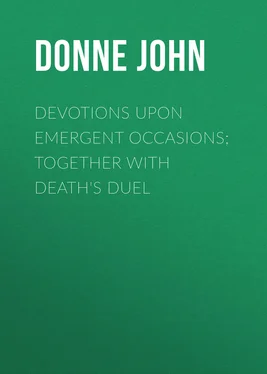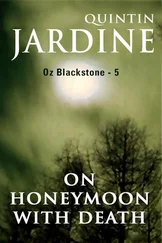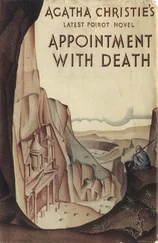John Donne - Devotions Upon Emergent Occasions; Together with Death's Duel
Здесь есть возможность читать онлайн «John Donne - Devotions Upon Emergent Occasions; Together with Death's Duel» — ознакомительный отрывок электронной книги совершенно бесплатно, а после прочтения отрывка купить полную версию. В некоторых случаях можно слушать аудио, скачать через торрент в формате fb2 и присутствует краткое содержание. Издательство: Иностранный паблик, Жанр: foreign_prose, foreign_religion, Философия, foreign_psychology, foreign_antique, на английском языке. Описание произведения, (предисловие) а так же отзывы посетителей доступны на портале библиотеки ЛибКат.
- Название:Devotions Upon Emergent Occasions; Together with Death's Duel
- Автор:
- Издательство:Иностранный паблик
- Жанр:
- Год:неизвестен
- ISBN:нет данных
- Рейтинг книги:4 / 5. Голосов: 1
-
Избранное:Добавить в избранное
- Отзывы:
-
Ваша оценка:
- 80
- 1
- 2
- 3
- 4
- 5
Devotions Upon Emergent Occasions; Together with Death's Duel: краткое содержание, описание и аннотация
Предлагаем к чтению аннотацию, описание, краткое содержание или предисловие (зависит от того, что написал сам автор книги «Devotions Upon Emergent Occasions; Together with Death's Duel»). Если вы не нашли необходимую информацию о книге — напишите в комментариях, мы постараемся отыскать её.
Devotions Upon Emergent Occasions; Together with Death's Duel — читать онлайн ознакомительный отрывок
Ниже представлен текст книги, разбитый по страницам. Система сохранения места последней прочитанной страницы, позволяет с удобством читать онлайн бесплатно книгу «Devotions Upon Emergent Occasions; Together with Death's Duel», без необходимости каждый раз заново искать на чём Вы остановились. Поставьте закладку, и сможете в любой момент перейти на страницу, на которой закончили чтение.
Интервал:
Закладка:
And to the end it may appear how just a steward he was of his Lord and Master's revenue, I have thought fit to let the reader know, that after his entrance into his Deanery, as he numbered his years, he, at the foot of a private account, to which God and His Angels were only witnesses with him,—computed first his revenue, then what was given to the poor, and other pious uses; and lastly, what rested for him and his; and having done that, he then blessed each year's poor remainder with a thankful prayer; which, for that they discover a more than common devotion, the reader shall partake some of them in his own words:—
So all is that remains this year [1624-5]—
"Deo Opt. Max. benigno largitori, á me, at ab iis quibus hæc à me reservantur, gloria et gratia in æternum. Amen."
Translated thus.
To God all Good, all Great, the benevolent Bestower, by me and by them, for whom, by me, these sums are laid up, be glory and grace ascribed for ever. Amen.
So that this year, [1626,] God hath blessed me and mine with—
"Multiplicatæ sunt super nos misericordiæ tuæ, Domine."
Translated thus.
Thy mercies, Oh Lord! are multiplied upon us.
"Da, Domine, ut quæ ex immensâ bonitate tuâ nobis elargiri dignatus sis, in quorumcunque manus devenerint, in tuam semper cedant gloriam. Amen."
Translated thus.
Grant, Oh Lord! that what out of Thine infinite bounty Thou hast vouchsafed to lavish upon us, into whosoever hands it may devolve, may always be improved to thy glory. Amen.
"In fine horum sex annorum manet [1627-8-9]—
"Quid habeo quod non accepi a Domino? Largitur etiam ut quæ largitus est sua iterum fiant, bono eorum usu; ut quemadmodum nec officiis hujus mundi, nec loci in quo me posuit dignitati, nec servis, nec egenis, in toto hujus anni curriculo mihi conscius sum me defuisse; ita et liberi, quibus quæ supersunt, supersunt, grato animo ea accipiant, et beneficum authorem recognoscant. Amen."
Translated thus.
At the end of these six years remains—
What have I, which I have not received from the Lord? He bestows, also, to the intent that what He hath bestowed may revert to Him by the proper use of it: that, as I have not consciously been wanting to myself during the whole course of the past year, either in discharging my secular duties, in retaining the dignity of my station, or in my conduct towards my servants and the poor—so my children for whom remains whatever is remaining, may receive it with gratitude, and acknowledge the beneficent Giver. Amen.
But I return from my long digression.
We left the Author sick in Essex, where he was forced to spend much of that winter, by reason of his disability to remove from that place; and having never, for almost twenty years, omitted his personal attendance on his Majesty in that month, in which he was to attend and preach to him; nor having ever been left out of the roll and number of Lent Preachers, and there being then—in January, 1630—a report brought to London, or raised there, that Dr. Donne was dead; that report gave him occasion to write the following letter to a dear friend:—
"Sir,
"This advantage you and my other friends have by my frequent fevers, that I am so much the oftener at the gates of Heaven; and this advantage by the solitude and close imprisonment that they reduce me to after, that I am so much the oftener at my prayers, in which I shall never leave out your happiness; and I doubt not, among His other blessings, God will add some one to you for my prayers. A man would almost be content to die—if there were no other benefit in death—to hear of so much sorrow, and so much good testimony from good men, as I—God be blessed for it—did upon the report of my death; yet I perceive it went not through all; for one writ to me, that some—and he said of my friends—conceived I was not so ill as I pretended, but withdrew myself to live at ease, discharged of preaching. It is an unfriendly, and, God knows, an ill-grounded interpretation; for I have always been sorrier when I could not preach, than any could be they could not hear me. It hath been my desire, and God may be pleased to grant it, that I might die in the pulpit; if not that, yet that I might take my death in the pulpit; that is, die the sooner by occasion of those labours. Sir, I hope to see you presently after Candlemas; about which time will fall my Lent Sermon at Court, except my Lord Chamberlain believe me to be dead, and so leave me out of the roll: but as long as I live, and am not speechless, I would not willingly, decline that service. I have better leisure to write, than you to read; yet I would not willingly oppress you with too much letter. God so bless you and your son, as I wish to
"Your poor friend and Servant "In Christ Jesus, "J. Donne."Before that month ended, he was appointed to preach upon his old constant day, the first Friday in Lent: he had notice of it, and had in his sickness so prepared for that employment, that as he had long thirsted for it, so he resolved his weakness should not hinder his journey; he came therefore to London some few days before his appointed day of preaching. At his coming thither, many of his friends—who with sorrow saw his sickness had left him but so much flesh as did only cover his bones—doubted his strength to perform that task, and did therefore dissuade him from undertaking it, assuring him, however, it was like to shorten his life: but he passionately denied their requests, saying "he would not doubt that that God, who in so many weaknesses had assisted him with an unexpected strength, would now withdraw it in his last employment; professing an holy ambition to perform that sacred work." And when, to the amazement of some beholders, he appeared in the pulpit, many of them thought he presented himself not to preach mortification by a living voice, but mortality by a decayed body, and a dying face. And doubtless many did secretly ask that question in Ezekiel (chap. xxxvii. 3), "Do these bones live? or, can that soul organise that tongue, to speak so long time as the sand in that glass will move towards its centre, and measure out an hour of this dying man's unspent life? Doubtless it cannot." And yet, after some faint pauses in his zealous prayer, his strong desires enabled his weak body to discharge his memory of his preconceived meditations, which were of dying; the text being, "To God the Lord belong the issues from death." Many that then saw his tears, and heard his faint and hollow voice, professing they thought the text prophetically chosen, and that Dr. Donne had preached his own Funeral Sermon.
Being full of joy that God had enabled him to perform this desired duty, he hastened to his house; out of which he never moved, till, like St. Stephen, "he was carried by devout men to his grave."
The next day after his sermon, his strength being much wasted, and his spirits so spent as indisposed him to business or to talk, a friend that had often been a witness of his free and facetious discourse asked him, "Why are you sad?" To whom he replied with a countenance so full of cheerful gravity, as gave testimony of an inward tranquillity of mind, and of a soul willing to take a farewell of this world, and said:—
"I am not sad; but most of the night past I have entertained myself with many thoughts of several friends that have left me here, and are gone to that place from which they shall not return; and that within a few days I also shall go hence, and be no more seen. And my preparation for this change is become my nightly meditation upon my bed, which my infirmities have now made restless to me. But at this present time, I was in a serious contemplation of the providence and goodness of God to me; to me, who am less than the least of His mercies: and looking back upon my life past, I now plainly see it was His hand that prevented me from all temporal employment; and that it was His will I should never settle nor thrive till I entered into the Ministry; in which I have now lived almost twenty years—I hope to His glory,—and by which, I most humbly thank Him, I have been enabled to requite most of those friends which shewed me kindness when my fortune was very low, as God knows it was: and—as it hath occasioned the expression of my gratitude—I thank God most of them have stood in need of my requital. I have lived to be useful and comfortable to my good Father-in-law, Sir George More, whose patience God hath been pleased to exercise with many temporal crosses; I have maintained my own mother, whom it hath pleased God, after a plentiful fortune in her younger days, to bring to great decay in her very old age. I have quieted the consciences of many, that have groaned under the burden of a wounded spirit, whose prayers I hope are available for me. I cannot plead innocency of life, especially of my youth; but I am to be judged by a merciful God, who is not willing to see what I have done amiss. And though of myself I have nothing to present to Him but sins and misery, yet I know He looks not upon me now as I am of myself, but as I am in my Saviour, and hath given me, even at this present time, some testimonies by His Holy Spirit, that I am of the number of His Elect: I am therefore full of inexpressible joy, and shall die in peace."
Читать дальшеИнтервал:
Закладка:
Похожие книги на «Devotions Upon Emergent Occasions; Together with Death's Duel»
Представляем Вашему вниманию похожие книги на «Devotions Upon Emergent Occasions; Together with Death's Duel» списком для выбора. Мы отобрали схожую по названию и смыслу литературу в надежде предоставить читателям больше вариантов отыскать новые, интересные, ещё непрочитанные произведения.
Обсуждение, отзывы о книге «Devotions Upon Emergent Occasions; Together with Death's Duel» и просто собственные мнения читателей. Оставьте ваши комментарии, напишите, что Вы думаете о произведении, его смысле или главных героях. Укажите что конкретно понравилось, а что нет, и почему Вы так считаете.


![Элизабет Ленхард - Свидание со смертью[Date With Death]](/books/79651/elizabet-lenhard-svidanie-so-smertyu-date-with-dea-thumb.webp)









